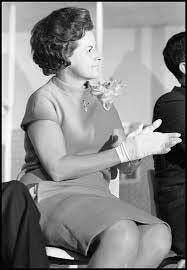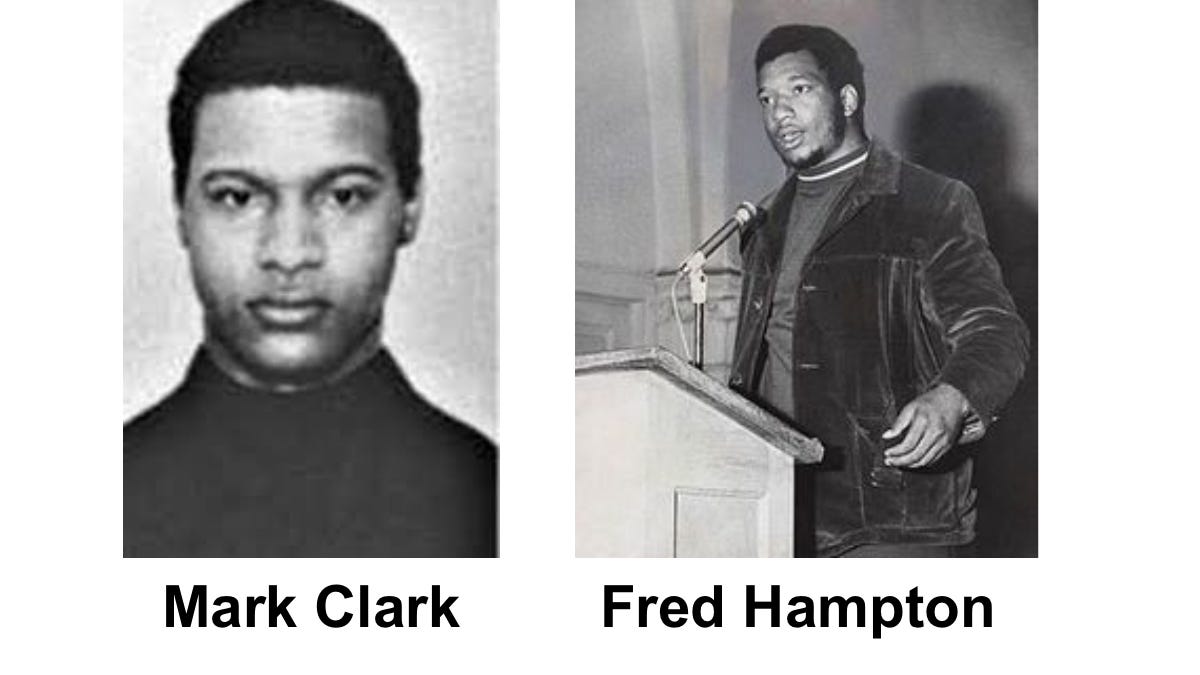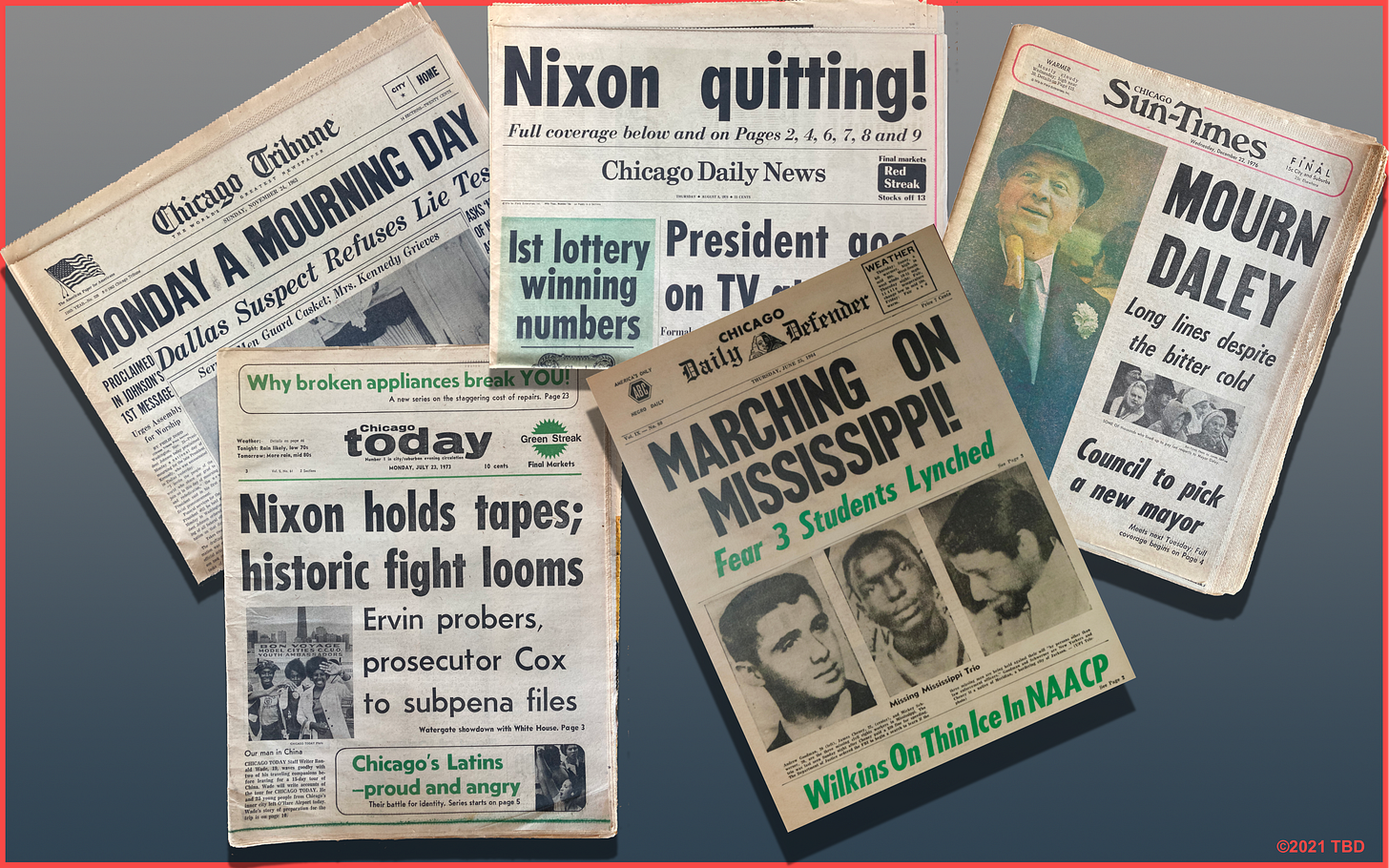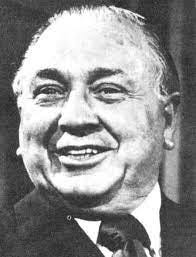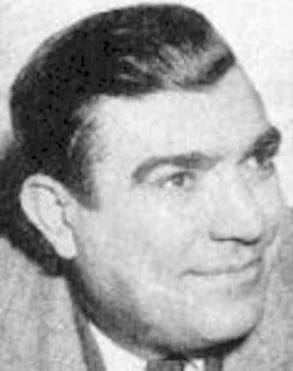Mike Royko 50 Years Ago Today: Political fistfights and the St. Patrick's Day Parade
Weekly Compilation: March 6-12, 1972
To access other parts of this site, click here for the Home Page.
Why do we run this separate item, Mike Royko 50 Years Ago Today? Because Steve Bertolucci, the hero of the serialized novel central to this Substack, “Roseland, Chicago: 1972,” lived in a Daily News household. The Bertolucci’s subscribed to the Daily News, and back then everybody read the paper, even kids. And if you read the Daily News, you read Mike Royko. Read the daily Royko briefing Monday-Friday on Twitter, @RoselandChi1972.
March 6, 1972
Note: If you need background on the whole Muskie Cries saga, or want a refresher anyway, see THIS CRAZY DAY IN 1972 here, the March 3 Muskie entry. FYR (For Younger Readers), if you don’t know what “the Muskie Cries saga” means, you’ll definitely want to check it out.
Cryin’ shame in Hampshire
Mike answers your questions on the imminent 1972 New Hampshire primary, a classic Royko column archetype.
“Q. What is the major issue in this year’s New Hampshire primary?
“A. Crying.
“Q. How did this become a major issue?
“A. It was raised in a surprise move by Sen. Edmund Muskie, when he wept on TV because a newspaper printed snide remarks about his wife.
“Q. Did any other candidates cry?
“A. No. Why should they? It wasn’t their wife.”
“Q. What are the political experts predicting?
“A. They aren’t sure, because nothing like this has happened before, and political experts always base their expert predictions on having been wrong in the past. In this case, they have no yardstick because candidates have not wept in the past, except in Chicago in 1968, and that was the result of tear gas.”
“Q. Does anyone favor [crying]?
“A. Yes. Some people say it makes them feel good to see a candidate cry. They wouldn’t mind hearing a few of them howl in pain, too.”
March 7, 1972
And in this corner…!
“An exciting new issue was injected into the state’s attorney’s race by Raymond Berg when he announced that he is the best fistfighter and can beat up the other candidates.”
Recall that incumbent Cook County State’s Attorney Edward Hanrahan is under indictment for conspiracy to obstruct the investigation of the 1969 predawn raid by police working for his office that killed Black Panthers Fred Hampton and Mark Clark.
After Hanrahan lost his last legal bid to quash that indictment, Mayor Daley dropped him from the official Democratic slate for the primary, and put in Traffic Court Judge Raymond Berg instead.
Hanrahan refused to drop out of the race. But Berg has refused to participate in any of the debates with Hanrahan and independent Democrat Donald Moore. Berg probably doesn’t want to debate because he’d have to talk about what happened with the voter petitions to get him on the ballot.
Mayor Daley announced Berg’s candidacy on the same day the petitions were due at the County Clerk’s office, and Machine flunkies spent the next six hours forging signatures on the petitions to make the deadline. Mike Royko broke that story on December 21. Several groups have been investigating it, including the Better Government Association, against a lot of bureaucratic and legal roadblocks. The investigations have kind of dropped out of the news, as they’ve been stymied so far.
Today, Mike reports that when Berg refused the latest opportunity to debate, he also said:
“In the last debate they had on TV, Hanrahan threatened to punch Moore in the nose. I got through college on a boxing scholarship and if I had to, I could lick either one of them.”
Hanrahan never said that, Mike notes, but says the candidates are entitled to their fantasies. Also, Mike checked on that boxing scholarship. Judge Berg’s college dropped boxing as a team sport when Berg was a freshman.
Nevertheless, Mike is excited about a fight. This is not unexpected—recall that Mike encouraged a threatened fight in the Daily News city room between Sun-Times columnist Tom Fitzpatrick and Daily News columnist Mort Edelstein, covered in the Chicago Journalism Review and reproduced in the Weekend Edition of Mike Royko 50 Years Ago Today.
“Ben Bentley, the city’s leading fight promoter, said the matches would have great box-office potential,” writes Mike today. “‘With Berg and Hanrahan and Moore on the ticket, I could pack any arena. Even people who are not interested in boxing would come out if they thought they could see a politician bleed from the nostrils.’”
Hanrahan refuses to comment. Too bad we don’t have a transcript of Mike’s phone call with Hanrahan’s people. Donald Page Moore has an aide read Mike a statement that says Moore was a combat paratrooper, and he’d prefer to use his brains over fists: “We have relied upon political muscle for too long in Cook County.”
Judge Berg did not challenge Bernard Carey, the Republican candidate. But when Mike calls Carey, he accepts the challenge anyway.
“He can not whup me,” says Carey. “I won’t claim to be a CYO boxing champ as he does, but I can point to my FBI background training in judo, karate and other hand-to-hand combat.”
Carey says he wants to fight barefoot so he can use karate, adding: “I am sure Berg would want want to use his feet, too. Since he is talking like a jackass he might as well fight like one.”
Don’t forget to check out Chapter 3 Notes: Chicago Newspapers Circa 1972.
“Simply wonderful! A must-read!” —Carol Marin
March 8, 1972
Why amnesty? Well, why not
One of Mike’s periodic columns of “Letters, calls, complaints and great thoughts from readers”. Two letters and comments are must-reads.
Letter #1: Vietnam amnesty
In ’72, the U.S. Senate is currently holding hearings on a potential amnesty. The armed forces continue drafting new young men, though in reduced numbers. Supposedly only 50,000 will be drafted in ’72—which is still quite a lot of people who are somebody’s son.
Remember, this is long past the release of the Pentagon Papers, and everybody knows what a crock of shit the Vietnam war is, and always was.
At last week’s Senate hearings, the father of a soldier who was killed in 1968 absolutely ripped Sen. Ted Kennedy and other senators for even considering amnesty.
Martin Kelly, whose son died in the A Shau Valley, yelled that Kennedy and others now supporting amnesty were the same politicians who “passed laws that sent men to their deaths” in Vietnam. See the This Crazy Day In 1972, March 1 entry for more on that.
FYI, Mike assumed he would be drafted for the Korean War, and instead volunteered. He was shipped to Korea and served six months there before the Korean Armistice ended combat. Mike was a radio technician often sent ahead of the troops toward the enemy, and saw some combat himself.
See Mike’s column on Pat Boone’s over-the-top pro-Vietnam War song from 1966, “Wish You Were Here, Buddy” for more on Mike’s Vietnam thoughts.
As I noted when writing up that 1966 column, consider what your preconceptions are of how a veteran who’s seen overseas combat will think about an issue like Vietnam draft evaders. Hold that thought, and see how it matches up with Mike’s response to this letter.
“WILLIAM ANDERSON, Chicago: I would like to go on record as saying I will vote against any candidate for any office who speaks in favor of any form of amnesty for the cowards who evaded the draft.
“You and other journalists should speak out loud and clear against this kind of thinking. Rather than granting them amnesty, they should be barred forever from this country, and if they return, put against a wall and shot like the traitors they are.”
“COMMENT: But we have already granted amnesty to so many others. We grant amnesty, and elevate to higher office, those great men of government who got us into this war, and kept us there after the stupidity of it all became obvious. We grant amnesty to those men in the military who lied to us about our successes. We grant amnesty to the parade-happy superpatriots who never bothered to read a book or magazine on Vietnam, but were quick to encourage sending more and more young men to die for the honor of apple pie and John Wayne. We grant amnesty to the sons of the wealthy and the politically powerful, who managed to slide through their draft years in weekend reserve units, and to the professional athletes who never seem able-bodied enough to swab a deck or work in an orderly room. If you make the firing squad big enough for everyone, I’ll be glad to give the command to fire. If not, amnesty is the only sane solution.”
Letter #2: re Northern Ireland’s “Troubles”
Mike has gotten plenty of mail castigating his February 15, 1972 column, and this is one more. On Feb. 15, Mike made fun of Mayor Daley and U.S. Rep. Roman Pucinski for their over-the-top public responses to Bloody Sunday, one of the worst incidents of “the Troubles” in Northern Ireland.
Mayor Daley is famously Irish—
—and Pucinski is running a hopeless campaign to unseat incumbent Republican U.S. Sen. Chuck Percy.
Daley and Pucinski both want Irish-American votes, of course.
Northern Ireland is obviously a complicated issue, since England took over Ireland and tried to starve the Irish during the potato famine in the previous century--so there’s always that. However, the current Irish Republican Army’s terrorist tactics including bombings are also, shall we say, problematic. In response, Britain has been using an “internment policy” to imprison suspected IRA members without trial. At the time of Bloody Sunday, there were 700 internees.
“Bloody Sunday” occurred January 30, 1972 when 10,000 Irish marched peacefully but illegally in Derry. After a few protesters threw rocks at British soldiers, the soldiers opened fire, killing 14 and injuring 13. A 2010 British government report finally ruled the soldiers fired first, and without sufficient provocation. The prime minister apologized and offered compensation to relatives, almost 40 years later.
Mayor Daley co-chairs the Chicago Irish Relief Fund, which has raised $200,000—$1.3 million in 2022 money. After Bloody Sunday, Daley called the British soldiers “storm troopers” and sent a total of $75,000 to the Catholic primate of Ireland “to bring aid to all the victims”.
Pucinski made a rousing speech to a group called the Irish Northern Aid Committee, saying that the U.S. refusing to intervene directly in Northern Ireland was “the first time the American government has failed to respond to an act of genocide….We are seeing the systematic extermination of Irish Catholics in Northern Ireland.”
In reality, Secretary of State William Rogers had said that the U.S. was “not in a position to intervene” in the British-Irish crisis, but the U.S. would consider “a useful role” if both the British and Irish asked.
Now, the letter and response:
“ROBERT KELLY, Chicago: I’m surprised that you, after making so much noise about the oppression of this country’s so-called minority groups, are so indifferent to the situation of the downtrodden in Ireland. It makes me wonder if you are sincere, since you are not consistent.
“COMMENT: And I am surprised that so many people who make so much noise about the oppression of the downtrodden in Ireland are so indifferent to the oppression of this country’s minority groups. It makes me wonder if they are sincere, since they are not consistent.”
March 9, 1972
Irishmen are bred, not born
Mike is disillusioned. He always thought the St. Patrick’s Day Parade “was held so people of Irish ancestry could honor their patron saint and celebrate their ethnic heritage.”
“But now I find that some people of Irish ancestry are barred from taking part. Yet, others who are not at all Irish are permitted to march in a position of honor and prominence--up front, where they do not have to walk behind the horses.”
Who’s been barred? Republican candidate for state’s attorney Bernard Carey.
Carey ran for sheriff in 1970 and asked to march in the parade, and the parade authorities said no. But his Democratic opponent, Dick Elrod, now Cook County sheriff, did march. Elrod, notes Mike, is “a member of Temple Sholom.”
This year, Carey won’t be allowed to march either--but his opponent, the Democratic candidate endorsed by Mayor Daley, will be there. As Mike puts it, “Raymond Berg, a Scandinavian, will be marching right up front.”
Mike seeks out the guy in charge of the parade invitations, a city employee named Dan Lydon--“and it turned out that he is also Berg’s campaign manager.”
“Lydon ducked phone calls and took shelter in an inner office when I tried to interview him. Too bad, because I would have also liked to ask how Eco Coli, a big-time Syndicate gangster, happened to march up front a few years ago.”
March 10, 1972
Coffee, tea or bomb scare
Mike talks to two stewardesses who are thinking it’s time to get out of the air before they get shot or blown up. Go over to this week’s THIS CRAZY DAY IN 1972 weekly compilation to see why.
“The glamor and excitement of being an airline stewardess is fading fast for the two pretty young women. Bombs and guns can do that.”
The two stewardesses tell Mike “the airlines have such sloppy security that this is going to keep right on happening. Anybody with a gun or a bomb who wants to get on a plane can do it.”
Mike points to the recent headline: “Security tightened at O’Hare.”
The stewardesses say things will tighten for a couple of weeks, then “You’ll be able to walk onto a plane with a pair of pistols in your belt.” Plus, a lot of the time, nobody even checks for a boarding pass, they say--so the hijacker probably won’t have to buy a ticket, either.
They say the way the metal detectors work is that two crew members hold metal detecting equipment and passengers walk past them--but the airlines have been cutting employees, and they generally don’t have enough crew to work the metal detectors.
And anybody can plant a bomb on a plane, too, say the stewardesses. “You see a lot of planes sitting on the ground with nobody on them and the jetway door open….Security is nothing more than a joke, and anybody who works for an airline knows it.”
Bottom line, the stewardesses baldly state the reason nothing is done to stop hijacking: The airlines don’t want to pay for it.
March 11-12, 1972
As we here all know, weekends could be sad for a Daily News family because Mike Royko wasn’t in the Daily News’ single weekend edition. So we look for Mike elsewhere on weekends.
This week, I delved into mobster Eco Coli, mentioned in Mike’s March 9 column on Republican candidate for State’s Attorney Bernard Carey thwarted desire to march in the 1972 St. Patrick’s Day parade. When Mike hunted down the guy organizing the parade, city employee Dan Lydon, he ducked into an inner office to avoid Mike.
“Too bad,” wrote Mike, “because I would have also liked to ask how Eco Coli, a big-time Syndicate gangster, happened to march up front a few years ago.”
Eco Coli
Mike confused the St. Patrick’s Day parade with the 1969 Columbus Day parade. As The Mafia Encyclopedia puts it:
Coli was the source of considerable political embarrassment when he marched most prominently between Mayor Richard Daley and Governor Richard Ogilvie in Chicago's 1969 Columbus Day Parade. After the parade both officials said they were not aware of his criminal background.
Oddly, none of that embarrassment was reported in the Tribune, which has no entry for James Eco Coli in its digital archive surrounding that Columbus Day, no matter how I search his name, except for the big picture below. The Sun-Times digitized archives don’t start until 1986, and the Daily News and Chicago Today are only available on microfilm for 1969. So unfortunately, today I cannot detail the “considerable political embarrassment.”
But Eco Coli was there all right.
That’s 1969 Eco Coli, who had started going by “James Coli” by then, right in the center between Mayor Daley and Gov. Ogilvie. Ogilvie is far left, his face blacked out by the bad quality of the online digitized Trib archive PDF.
Eco Coli was a very busy boy in the 1950s, with an apparent specialty in “hijacking” slot machines from various places like the Olympia Fields Country Club, Moose Lodges and places like the John F. Conley American Legion post at 3548. W. North Ave.
As a 1953 Tribune article explains, “The crime syndicate now gets nothing from the private operation of slot machines in McHenry county, but intimidation of clubs and fraternal groups long has been practiced by mobsters in other places in order to get 30 to 40 per cent of the take.”
Eco Coli spent a lot of time in court in the ‘50s, but he got continual continuances, and eventually his few convictions were cleared by the Illinois Supreme Court.
Witnesses are not always eager to identify Eco Coli.
Fun Eco Coli Fact: At his Olympia Fields trial, “three witnesses identified Coli as the man who guarded them in a locker room…while a companion carried out the slot machines….Coli and his wife, Dolores, 25, testified that Coli, at the time of the robbery, was giving her an engagement ring at Harrison and Clark sts.”
Less entertainingly, Coli was suspected of murdering Charles Gross, a 31st Ward Republican committeeman who was a member of the aforementioned Conley American Legion post, which lost its slot machines. According to Tribune accounts, Gross “was said to have complained that members of the Legion post had sold out to the hoodlums. Gross was also said to have asserted that he would make sure that there would be no ‘fix’ in another hijacking case pending against Coli. Gross was slain shortly afterward.” That was 1952.
Coli’s spate of alleged hijackings ended when he became head of Teamster Local 727 in 1960. Edward Gale founded that local, but he unexpectedly quit, letting Coli step in. “Federal agents tried but failed to get Gale to explain why he quit so suddenly,” the Trib reported.
Several locals came under federal investigation for potentially misappropriating funds in 1976, including 727. The Trib’s George Bliss reported that after Coli got his union position, he was “prominent in local and state government affairs and has had his photograph appear in the newspaper with notables such as Mayor Daley and former Gov. Richard Ogilvie.”
Bliss probably meant that 1969 Columbus Day parade. Coli would elude federal investigators, dying of natural causes in 1982, still head of Local 727.
But you might remember Eco Coli’s son, John T. Coli Sr., who became head of Local 727 too—succeeding his brother James, who directly succeeded Eco. Ironically, James was forced out because he knew another union guy had mob ties but did nothing about it.
John T. Coli Sr. pled guilty to extortion in 2019, after threatening Cinespace owner Alexander Pissios with labor problems if Pissios didn’t pay him $325,000. A terrific Sun-Times account by Robert Herguth leads with one of John Coli’s favorite sayings:
“Pigs get fat. Hogs gets slaughtered.”
Only one week before Chapter 4: The Gately’s Doughnut drops—and your chance to win some cool 1972 stuff is over. Check out the full prize list here.
By the way, this feature is no substitute for reading Mike’s full columns. He’s best appreciated in the clear, concise, unbroken original version. Mike already trimmed the verbal fat, so he doesn’t need to be summarized Reader’s Digest-style, either. Our purpose here is to give you some good quotes from the original columns, but especially to give the historic and pop culture context that Mike’s original readers brought to his work. You can’t get the inside jokes if you don’t know the references. Plus, many columns didn’t make it into the collections, so unless you dive into microfilm, there are some columns covered here you will never read elsewhere. If you don’t own any of Mike’s books, maybe start with “One More Time,” a selection covering Mike’s entire career and including a foreword by Studs Terkel and commentaries by Lois Wille.
Do you dig spending some time in 1972? If you came to MIKE ROYKO 50 YEARS AGO TODAY from social media, you may not know it’s part of the book being serialized here, one chapter per month: “Roseland, Chicago: 1972.” It’s the story of Steve Bertolucci, 10-year-old Roselander in 1972, and what becomes of him. Check it out here.
To get the weekly compilation of MIKE ROYKO 50 YEARS AGO TODAY in your mailbox along with THIS CRAZY DAY IN 1972 and new chapters of the book, SUBSCRIBE FOR FREE!





